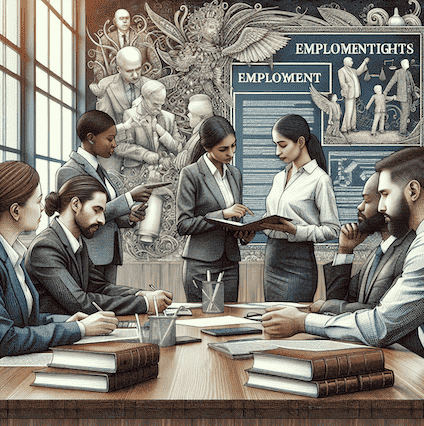Find the Best Employment Law Attorney Near Me Job
Find the Best Employment Law Attorney Near Me Job
Navigating the intricate landscape of employment law is critical, whether you’re an employer ensuring compliance with various regulations or an employee defending your rights in the workplace. With a multitude of laws such as the Americans with Disabilities Act, Family and Medical Leave Act, and Title VII of the Civil Rights Act governing workplace conduct, finding the right employment law attorney near me can serve as your pivotal ally in understanding and asserting your legal standing. This importance is accentuated in scenarios involving EEOC claims, age discrimination, or disputes over employment contracts, where the expertise of a seasoned workplace attorney near me can make a substantial difference in the resolution.
This article aims to guide you through the essentials of employment law, spotlighting common issues and highlighting how an employment law attorney can assist you in navigating these complexities. It will walk you through how to pinpoint the best employment disputes specialist for your situation, from considering how much does an employment lawyer cost to evaluating their experience with specific acts like the Age Discrimination in Employment Act. By unpacking the critical steps to find an adept employer attorney near me or employee rights lawyer near me, you will be equipped with the knowledge to secure legal representation that aligns with your needs, ensuring your rights are both recognized and respected in any employment matter.

Understanding Employment Law
What is Employment Law?
Employment law is a vital field designed to safeguard both employees and employers. It encompasses a range of regulations that ensure workplace safety, equitable hiring processes, and the protection against child labor. This branch of law also governs the hours employees can work and sets standards for wages, playing a crucial role in maintaining fair labor practices and resolving disputes efficiently. Through these regulations, businesses can focus more on productivity and less on legal conflicts, creating a balanced environment where the rights of both parties are protected.
Key Employment Law Statutes and Regulations
- Fair Labor Standards Act (FLSA):
- Administered by the Wage and Hour Division, the FLSA sets the baseline for wages and overtime pay affecting most employment sectors. It mandates that non-exempt employees receive at least the federal minimum wage and overtime pay at one-and-a-half times the regular rate for hours worked beyond the standard 40-hour workweek.
- Occupational Safety and Health Act (OSH Act):
- Enforced by the Occupational Safety and Health Administration (OSHA), this act requires employers to adhere to safety and health regulations, providing a workplace free from recognized hazards. OSHA covers most private industries and extends to public sector employers in states with OSHA-approved programs.
- Employee Retirement Income Security Act (ERISA):
- This act regulates employers offering pension or welfare benefit plans, imposing fiduciary, disclosure, and reporting requirements to protect the interests of employees in their company’s benefit plans.
- Family and Medical Leave Act (FMLA):
- The FMLA mandates employers with 50 or more employees to provide up to 12 weeks of unpaid, job-protected leave for eligible employees for reasons such as the birth or adoption of a child or serious health conditions affecting the employee or their immediate family members.
- Americans with Disabilities Act (ADA) and the Rehabilitation Act:
- These statutes ensure non-discrimination in the workplace for employees with disabilities, with the ADA providing comprehensive civil rights protections.
- Additional Statutes:
- Other important laws include the Age Discrimination in Employment Act, the Civil Rights Act of 1964, and the National Labor Relations Act, each contributing to a comprehensive framework that addresses various aspects of employment and labor law.

The U.S. Department of Labor (DOL) administers many of these federal laws, offering compliance assistance through resources like the elaws Advisors and the Job Accommodation Network (JAN). These tools help employers and employees understand their rights and responsibilities, ensuring adherence to the law and promoting a fair working environment.
Common Employment Law Issues
Discrimination
Discrimination in the workplace is a significant issue that manifests in various forms. It is illegal to discriminate against someone based on race, color, religion, sex (including gender identity, sexual orientation, and pregnancy), national origin, age (40 or older), disability, or genetic information. This includes all aspects of employment such as hiring, firing, promotions, training, wages, and benefits. Discriminatory practices can also involve job advertisements, recruitment processes, and other employment conditions that discourage or show preference based on these protected classes. Workplace discrimination is a serious issue that an experienced employment lawyer near me can help address.
Harassment
Harassment is another prevalent employment law issue, recognized as unwelcome conduct based on protected characteristics. It becomes unlawful when enduring this conduct becomes a condition of continued employment, or when it creates a work environment that a reasonable person would consider intimidating, hostile, or abusive. Harassment can include offensive jokes, slurs, physical threats, and other forms of objectionable behavior. Employers are required to take preventive and corrective measures to address harassment, ensuring a safe and respectful workplace. Sexual harassment is a particularly egregious form of workplace harassment that a skilled labor law lawyer near me can help combat.
Wrongful Termination
Wrongful termination occurs when an employee is fired for reasons that are illegal under federal and state laws. This includes terminations due to discrimination, retaliation for participating in legal proceedings against discrimination, or whistleblowing on illegal activities. Employees terminated under these unlawful circumstances may have grounds to file a claim against their employers. Understanding the specifics of wrongful termination is crucial for both employees and employers to avoid costly legal disputes. A knowledgeable employment rights attorney can provide guidance on navigating wrongful termination cases.
Wage and Hour Issues
Wage and hour violations are common and include unpaid overtime, misclassification of employees as exempt from overtime, and failure to adhere to minimum wage laws. The Fair Labor Standards Act (FLSA) sets the rules for wages, overtime pay, and recordkeeping. Employers must ensure that they comply with these regulations to avoid legal issues. Common pitfalls include misclassifying salaried employees as ineligible for overtime and failing to pay for all hours worked, including certain on-call times and preparation activities. Employers should regularly review their policies and practices with legal experts to ensure compliance and avoid potential disputes. Wage theft is a serious issue that labor attorneys for employees can help address.
How an Employment Law Attorney Can Help You
Legal Advice and Representation
When you’re faced with employment law issues, having a dedicated employment law attorney by your side can make a significant difference. Whether you’re dealing with contract disputes, wrongful termination, or negotiating severance packages, an attorney can provide the legal expertise you need. They can interpret complex legal jargon and ensure that your rights are protected in any employment agreement or dispute. For instance, if you’re promised certain benefits like sales commissions or PTO that are not delivered, an attorney can help you understand your entitlements and assist in recovering what is owed to you.
Employment law attorneys are adept at handling a variety of issues including breaches of contract, non-compete agreements, and issues related to the Family and Medical Leave Act (FMLA) and the Employee Retirement Income Security Act (ERISA). They can also assist with pension issues and failure to remit wages. If you’ve been wrongfully terminated or are facing retaliation after reporting discrimination or harassment, an employment law attorney can offer crucial support and representation. A skilled workplace lawyer near me can provide the legal advice and representation needed to protect your rights.
Navigating Employment Contracts and Agreements
Navigating employment contracts and agreements can be daunting without legal expertise. An employment law attorney can review your contract at the outset of your employment, during, or even after your tenure, to ensure that your rights are safeguarded. They can help you understand the implications of the terms of your contract and advise on any potential issues. This is particularly important in cases where employers may overlook or deliberately breach contract terms.
For those entering new employment, it’s crucial to understand exactly who you are doing business with, whether it’s a small practice or a large corporate entity. An attorney can guide you through the specifics of your employment relationship, helping you understand non-compete clauses, and the nature of your job description, which may influence your professional and personal life significantly.
Furthermore, attorneys can assist in negotiating terms that are favorable to you, ensuring that your contract reflects your worth and protects your interests. They can help clarify any ambiguous clauses and ensure that your compensation covers all aspects of your job, including any potential expenses that might arise from travel or work supplies.
In summary, an employment law attorney not only provides legal representation but also ensures that you fully understand the terms of your employment contracts and agreements. They play a critical role in protecting your rights and helping you navigate the complexities of employment law, giving you the confidence and support needed to focus on your career. Finding the best employment attorney is crucial for safeguarding your interests in the workplace.

How to Find the Best Employment Law Attorney Near You
Finding the right employment law attorney is crucial for effectively handling your workplace issues. Here’s how you can locate a skilled and trustworthy employment lawyer:
Criteria for Choosing an Attorney
- Experience and Specialization: Ensure the attorney has experience beyond the general scope of employment law. Look for lawyers who specialize in the specifics of your case, such as discrimination, wrongful termination, or wage and hour disputes. A georgia employment lawyer with expertise in your specific issue can provide the best representation.
- Check Credentials and Disciplinary Records: Verify the attorney’s credentials and check if they have any disciplinary sanctions listed in the national lawyer regulatory database. This will help you avoid lawyers with ethical violations or professional misconduct. Ensure your employment attorney georgia is in good standing with the state bar.
- Consultations: Many employment lawyers offer free initial consultations. Use this opportunity to discuss your case and gauge the lawyer’s understanding of your situation. Ask about their past cases and outcomes to better understand their capability in handling issues similar to yours. A reputable georgia labor lawyer will be transparent about their experience and approach.
- Client Reviews and Attorney Reputation: Read client reviews and seek feedback from other attorneys. Positive reviews from both clients and peers are a good indicator of the lawyer’s competence and reputation in the legal community. Look for a well-regarded employment law attorney in georgia with a track record of success.
- Fee Structure: Understand how the attorney charges for their services. Some may work on a contingency basis, meaning they only get paid if you win the case, while others might charge hourly or flat fees. Make sure the fee arrangements are clear and agreeable to you. A transparent georgia employment lawyer will clearly explain their billing practices.
Resources and Directories
- Local Bar Association: Utilize your local bar association’s referral services. They can provide a list of employment attorneys who specialize in your needed area of law. The State Bar of Georgia can connect you with a qualified georgia labor lawyer.
- Online Legal Directories: Websites like Avvo and Justia offer extensive listings of attorneys and their profiles. These directories often include client reviews, ratings, and the lawyer’s area of expertise. You can find a reputable employment lawyer in georgia through these platforms.
- Legal Aid and Clinics: If cost is a concern, look for legal aid organizations in your area. These programs offer support and can sometimes connect you with attorneys willing to take cases at reduced fees or pro bono. Georgia legal aid services can help you find an affordable employment attorney georgia.
- Personal Referrals: Ask friends or family members who have faced similar legal issues for recommendations. Personal experiences can lead you to reliable attorneys who have proven their ability in real-world cases. A referral can help you find a trusted georgia employment lawyer.
- Professional Networks: Lawyers often have a network of peers. If you know an attorney in another field, they can often refer you to an employment lawyer who will meet your needs. A connected georgia labor lawyer can recommend a colleague specializing in your specific issue.
By following these guidelines, you can increase your chances of finding an employment law attorney who is well-equipped to handle your case and support your rights in the workplace. Remember, the right attorney can make a significant difference in the outcome of your employment issues. A skilled employment lawyer near me can provide the expertise and advocacy needed to protect your interests.
Conclusion
Through this exploration of employment law, it’s evident that the landscape is complex and nuanced, woven with a myriad of statutes and regulations aimed at protecting both employer and employee rights. From understanding the critical aspects of discrimination and harassment to navigating the intricacies of wage and hour laws, the importance of securing a knowledgeable employment law attorney cannot be overstated. Such expertise is invaluable in asserting one’s legal standing, negotiating employment contracts, and ensuring compliance with the varied legal frameworks govern workplace ethics and conduct.
As we’ve discussed, finding the right attorney involves considering factors like experience, specialization, and the attorney’s track in successfully handling similar cases. The guidance provided on where to begin your search, from utilizing your local bar association’s referral services to leveraging personal referrals, aims to equip you with the tools necessary for finding a trusted legal ally. Remember, the journey to resolving employment disputes and safeguarding your rights in the workplace is significantly bolstered by partnering with an attorney who understands your needs and navigates the legal landscape with dexterity and commitment. A skilled labour lawyer near me can be your strongest advocate in the face of workplace challenges.
FAQs
1. What is the average salary for an employment law attorney in Texas?
The average salary for an Employment Law Attorney I in Texas is approximately $95,064 as of May 28, 2024. Salaries generally range from $78,520 to $104,748.
2. What are the typical work environments for lawyers?
Lawyers are primarily employed in law offices and usually work in an office setting. They often travel to meet with clients in various locations, including homes or prisons, and they also appear in court. The nature of their work can be stressful, especially during trials or when facing tight deadlines. A work lawyer must be prepared to adapt to diverse work environments and demands.


